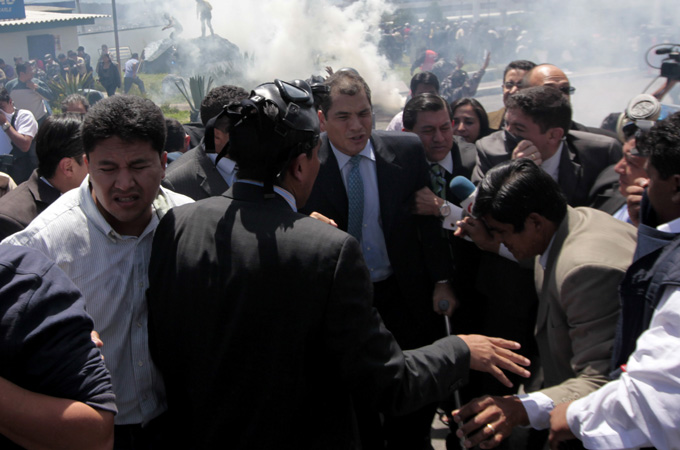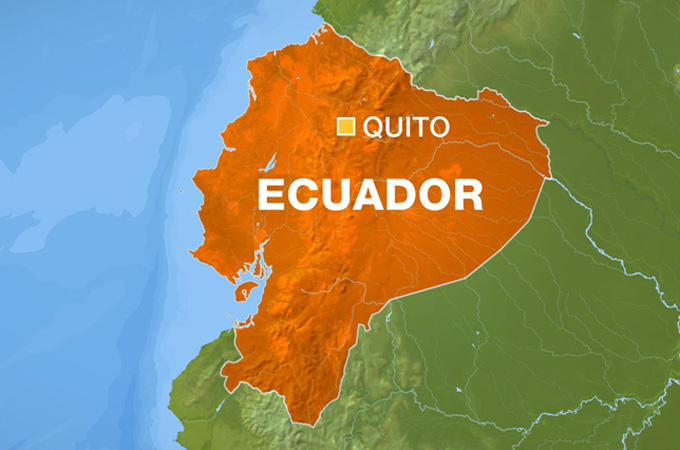State of emergency grips Ecuador
President accuses the opposition of an attempted coup after being hospitalised as police protested over benefit cuts.

 |
|
President Correa described the unrest “as an attempted coup by the opposition … history will judge them” [EPA] |
Ecuador’s army chief has demanded that a group of renegade police officers end an uprising against the government, which has already shut down the country’s main airport and sent the president to the hospital.
A state of emergency was declared on Thursday after officers stormed the runway at Quito’s international airport, while others burned tyres outside of bases across the capital.
The military is now in charge of public order, with civil liberties suspended and soldiers authorised to carry out searches without a warrant.
Rafael Correa, the president, was attacked with tear gas when he tried to speak to officers at a police barracks in Quito. The officers are angry about a law that has cut their benefits.
Local media reported that Correa challenged the officers to kill him.
“I’m not taking one step back,” he reportedly said. “Gentlemen, if you want to kill the president, here he is, kill him if you have the guts.”
General Ernesto Gonzalez, the army chief, has said that the officers involved “would have their rights respected” if they turn themselves in.
He said that the military remained loyal to Correa. “We are in a state of law. We are loyal to the maximum authority, which is the president,” he told reporters.
Correa ‘in danger’
Hugo Chavez, the president of Venezuela, said that Correa’s “life was in danger” and called the incident an attempted coup. The two presidents have had a close relationship over the last few years.
Correa was taken to a hospital after the incident at the barracks, and hundreds of his supporters quickly descended on the hospital, many of them throwing rocks at police officers stationed outside. Officers have reportedly used tear gas against the rioters.
Ricardo Patino, Ecuador’s foreign minister, called on a large crowd gathered outside the presidential palace to “rescue” Correa.
“[He] has said that there are people trying to get in from the roof and attack him,” Patino told the crowd. “I want to invite the brave people here below to go with us to rescue the president.”
Witnesses said there was looting in Quito and in the city of Guayaquil, and that many workers and school students were being sent home.
Police in the cities held protests at their headquarters. Officers in Guayaquil blocked some roads leading to the coastal city, Ecuador’s most populous.
“Respect our rights,” uniformed officers shouted.
But Patino played down the severity of the protests.
“This is not a popular mobilisation, it is not a popular uprising, it is an uprising by the police who are ill-informed,” he told the TV network Telesur.
Diego Borja, the central bank chief, called for calm and urged Ecuadoreans not to withdraw money from banks.
Political impasse
Ecuador, an member with a population of 14 million, has a long history of political instability. Street protests toppled three presidents during economic turmoil in the decade before Correa took power.
“The police are taking advantage of a political crisis in the National Assembly, the congress, in which the ruling party is split over legislation,” Colin Harding, a Latin America expert, told Al Jazeera in London.
 |
“They are taking the opportunity to take to the streets to press their demands.”
Members of Correa’s own left-wing party are blocking legislative proposals aimed at cutting state costs, prompting him to mull disbanding congress, a move that would let him rule by decree until new elections, one of his ministers said.
Ecuador’s two-year-old constitution allows the president to declare a political impasse that could dissolve congress until a new presidential and parliamentary elections can be held.
The measure would, however, have to be approved by the Constitutional Court to take effect.
“This a scenario that nobody would want, but it is a possibility when the conditions for change do not exist,” Doris Solis, the policy minister, said after meeting Correa and other senior officials late on Wednesday.
“A decision still has not been made,” she told reporters.
“Lawmakers in our coalition have the obligation to be coherent with our project for change.”
‘Citizen’s revolution’
More than half of the 124-member Congress are officially allied with Correa, but the president has blasted congressmen from his own Country Alliance party for not going along with his proposals for shrinking the country’s bureaucracy.
Correa, a US trained economist, was first elected in 2006 promising a “citizens’ revolution” aimed at increasing state control of Ecuador’s natural resources and fighting what he calls the country’s corrupt elite.
His government alienated international capital markets when it defaulted on $3.2 billion in global bonds two years ago. Correa described the debt as “illegitimate.”
Cash has been tight since then as the country relies on multilateral loans and bilateral lending to meet its international financing obligations.
Once in power, Correa backed the rewriting of the constitution to tilt the balance of power toward the executive. He easily won re-election under the new constitution in 2009, and he is allowed to stand again in 2013.